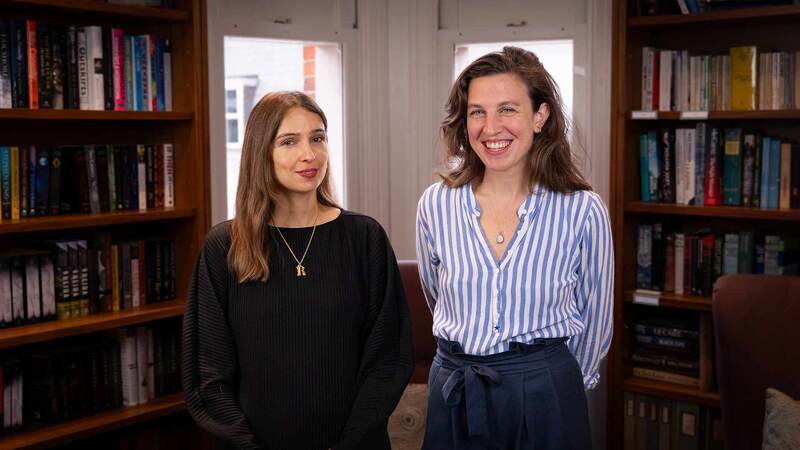You are viewing your 1 free article this month. Login to read more articles.
Collins Learning's boss Beecroft on leading the list through a pandemic
From the outside it would seem that Alex Beecroft did not take over as boss of Collins Learning at the easiest of times...
From the outside it would seem that Alex Beecroft did not take over as boss of Collins Learning at the easiest of times. After all, he became the HarperCollins division’s managing director in June last year, moving over from his previous corporate strategy role, in the teeth of one of the most difficult periods for education publishing in decades.
Not at all, he insists, as he is full of praise for predecessor Colin Hughes, who moved on to become chief executive of exam board AQA Education—now that was probably a difficult transition last year. The talented team Beecroft joined had already been tested by the first phase of the pandemic, as he describes: “When I arrived we were already well into the first lockdown and we had done a huge amount at that stage to make free resources available to schools, which was hugely significant in the spring last year. We had also responded to the home learning demand.”
Not that 2020 was an easy ride. But Collins probably had a bit of a better time of it than most of its education competitors last year, partially because its core business is domestic (around 75% of its revenue) and not export, the latter of which has been a more dicey proposition in the past 12–18 months. Its Easy Learning series is also a product that is perfectly tailored to home schooling; at one point during the spring 2020 lockdown, 36 of the Amazon top 100 were Easy Learning titles—that’s the overall top 100, not just schoolbooks. In total, Collins’ revenue jumped 5.7% in 2020, while the rest of the education sector dropped by around 20%.
The success was not just dumb luck, Beecroft says: “Sure, we had a series that was great for home learning. But we had launched it in 2006 and built and refined it over the years, so we had this well-published and mature list when lockdown hit. But also, we—and HarperCollins more broadly—really pride ourselves on the ability to optimise our titles on Amazon, so those sales were really the product of all the groundwork we have made to make those titles more visible online.”
Collins was not just leaning into its home learning side. One of Beecroft’s first big tasks was leading a huge digitisation on parts of its Big Cat reading series—the bulk of its sales come through institutional purchases—converting some 1,000 frontlist and backlist print titles and making them available for e-book subscriptions to schools. That move drove sales when the second and third lockdowns hit last year and early in 2021.
The heightened digital development may be a lasting consequence of the pandemic, he says. “It’s almost like it’s been five years of market development in the space of 18 months. What percentage of that change is permanent and what is responsive to the immediate needs of remote schooling no one really knows, but we have certainly seen robust demand for digital products, and we have seen a really high traction for the use of digital platforms for learning.”
Beecroft and Collins are betting that schools will continue to use digital more, even as the world moves towards some semblance of normality. Therefore, it has accelerated a few digital products, including the launch this autumn of Collins Adapt, an adaptive learning plat- form developed with a Danish ed-tech firm called Area9. The platform is for use by secondary school students at Key Stage 3 and GCSE levels.
Beecroft says: “One of the reasons for schools’ drive towards digital is that we are going to have this ongoing challenge around the knowledge gap. It is the big difficulty of the pandemic: each student has had a different lock- down, with some more affected by the learning they have missed. What digital platforms and tools can do is quickly help diagnose the gaps in learning for individual pupils, and give robust diagnostics on where that pupil is at and, with targeted interventions, bring them up to speed.”
An unusual history
Beecroft was not coming into the job unaware of the way Collins worked. He has been man and boy at HarperCollins, entering the company’s graduate scheme in 2009, fresh out of doing his undergraduate degree and a masters in medieval history at Oxford. He did not take the most obvious route for a medievalist: in corporate strategy and development, and the bulk of that role was working with HarperCollins c.e.o. Charlie Redmayne on the group’s pricing, analytics and mergers and acquisitions. Beecroft’s last big project before joining Collins was leading the purchase of Egmont UK, now rebranded as Farshore.
So, with an M&A background, will he be looking to add to Collins if the right company comes along? “Well, I don’t have an acquisition up my sleeve that I can tell you about,” he says. “Obviously, we are keen to grow the business, whether that is organically or with acquisitions—which could be an ed-tech business, or a more traditional print business. It just has to be the right fit strategically.”
His overall strategy “in the round” is to continue the rollout of digital products, not just new platforms such as Collins Adapt, but also the continuation and development of more mature products, such as the Collins Dictionary website. The resource had a rich content and algorithm update in 2020, leading to a huge spike in traffic. It drew almost 25 million users per month by the end of the year, compared to 17 million in 2019, and increased advertising revenue. (Unlike, say, the Oxford English Dictionary site, Collinsdictionary.com is completely free to access).
Beecroft adds that he is thinking less about acquisitions and more on partnerships. For example, Collins is linking up with Little Wandle Letters and Sounds, a reading programme developed out of two English Hubs (government-backed organisations scattered throughout England that help schools with literacy) to boost its phonics list. A partnership with White Rose Maths, a Yorkshire-based teacher-led group aimed at improving maths performance, has seen the development of a series of textbooks and teachers’ guides. Plus, he is looking across HarperCollins, with a series of books created in conjunction with Collins’ Farshore colleagues.
Diversity, too, is a big focus across the lists. For example, Beecroft says the Big Cat series has adopted the mantra “books like me” so that all children are represented, while this autumn will see the launch of a range of Black British history titles. He says: “Students have told us they want to see themselves reflected in the books, teachers say they want resources to help them deliver lessons on subjects like Black British history in a dynamic and practical way. And that’s at the heart of what we do, listening externally, or partnering and talking to organisations, so that we will always continue to look forward.”













